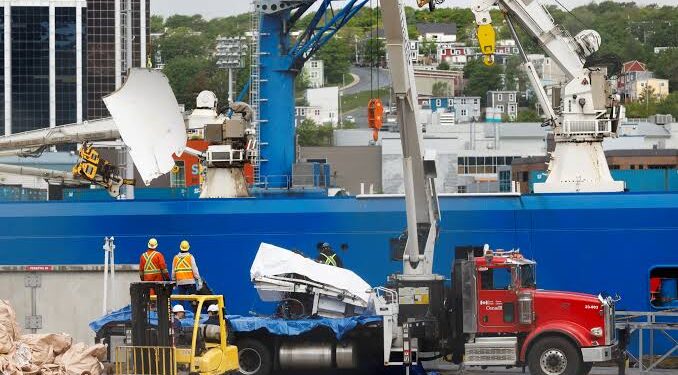Presumed human remains and debris from the tourist submersible crushed to pieces in an undersea implosion that killed all five people aboard were recovered from the ocean bottom and brought ashore to Canada on Wednesday, the U.S. Coast Guard said.
According to Reuters, the possible remains and shattered bits of the submersible Titan, destroyed while diving to the century-old wreck of the Titanic, were carried to St. John’s, Newfoundland, about 400 miles (650km) north of the accident site, by the Canadian-flagged vessel Horizon Arctic, according to the Coast Guard.
The evidence will be transported by a Coast Guard cutter to a U.S. port for analysis and testing by a marine board of investigation, convened by the Guard this week to conduct a formal inquiry into the loss of the Titan, the agency said.
U.S. medical professionals also “will conduct a formal analysis of presumed human remains that have been carefully recovered within the wreckage at the site of the incident,” the Coast Guard statement added.
The nature and extent of the possible remains recovered from the site were not specified.
Video from the Canadian Broadcast Corp showed what appeared to be the nose of the submersible and other shattered fragments wrapped in white tarp pulled up by a crane from the deck of the Horizon Arctic on Wednesday morning.
Footage also showed a shattered piece of the Titan’s hull and machinery with dangling wires being taken off the ship at St. John’s, where the expedition to the Titanic had begun.
Examination of the debris is expected to shed more light on the cause of the catastrophic implosion that shattered the Titan earlier this month as the 22-foot vessel carried five people on a voyage to the Titanic shipwreck in the North Atlantic.
Canada’s Transportation Safety Board (TSB), conducting its own inquiry, said its investigators had completed preliminary interviews with the crew of Titan’s Canadian-flagged surface support vessel, Polar Prince, and seized that ship’s voyage data recorder.
The TSB also said it had “inspected, documented and cataloged” all the materials recovered from the accident site before they were turned over to U.S. authorities.
Fragments of the submersible, which had lost contact with Polar Prince about one hour and 45 minutes into a two-hour descent on June 18, were found littering the seabed about 1,600 feet (488 meters) from the bow of the Titanic wreck four days later.
The discovery by a robotic deep-sea diving vehicle scrounging the ocean floor more than 2 miles (3km) down ended a multinational search that captured worldwide media attention and sealed the fate of the five people aboard.
Among the dead was Stockton Rush, the submersible pilot and CEO of U.S.-based OceanGate Expeditions, which owned and operated the Titan. Also killed were the British billionaire Hamish Harding, 58; Pakistani-born businessman Shahzada Dawood, 48, and his 19-year-old son, Suleman; and 77-year-old French oceanographer Paul-Henri Nargeolet.
ALSO READ:All Five People On Titanic Sub Feared Dead After ‘Catastrophic Implosion’
The accident has raised questions about the unregulated nature of such expeditions and the decision by OceanGate to forego third-party industry review and certification of Titan’s novel design.
“Our team has successfully completed off-shore operations, but is still on mission and will be in the process of demobilization from the Horizon Arctic this morning,” Pelagic Research, which operates a robotic vehicle used in recovering the debris, said in a statement.











